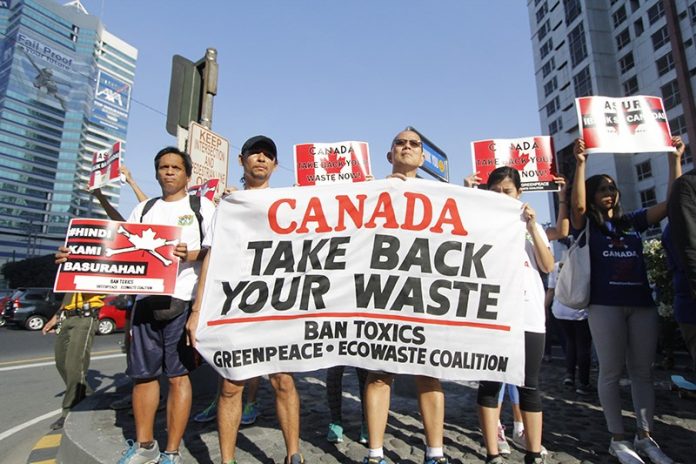Environmental groups Greenpeace Philippines and EcoWaste Coalition renewed calls for a total ban on waste importation, citing the need for improved protection of Filipinos against health risks from hazardous waste imports beyond the COVID-19 pandemic.
The call was made on May 30 to mark one year since the repatriation of 69 of 103 container vans of Canadian garbage, which was among the most controversial cases of illegal waste importation recorded in the country.
“The ratification of the Basel Ban Amendment (BBA) and the enactment of a total ban on waste imports is crucial, especially at a time when the nation grapples with recovery from a global pandemic that has led to the proliferation of medical and household waste,” said Greenpeace country director Lea Guerrero said.
“Lack of prohibitions on waste imports and poor enforcement of existing regulations leave the country open to future incidents of illegal waste trade, which often results in recipient countries shouldering the health and environmental costs of foreign waste.”
Citing a report released last March, the groups pointed out that ratifying the BBA, which prohibits all exports of hazardous wastes from rich nations to countries like the Philippines, would address policy gaps that leave our country prey to illegal as well as legitimized waste trade.
In the past two decades, there have been several reported high profile cases of illegal waste trade in the Philippines, from mixed municipal waste clearly not meant for recycling, to shredded municipal waste meant as feedstock for cement kilns that double as waste incinerators, to toxic chemical wastes intended for dumping.
Data from Greenpeace Southeast Asia show that, from 4,650 tons in 2016 and 4,267 tons in 2017, plastic waste imports to the Philippines ballooned to 11,761 tons in 2018. Most were exports from Japan, the United States, Taiwan, Indonesia, and Hong Kong.
Beyond the statistics, the environmental and health threats arising from waste importation are magnified by the COVID-19 pandemic. Without concrete policies, strict implementation and proper monitoring, Filipino communities, which are already burdened with public health concerns, waste management issues and the plastic crisis, are more likely to be exposed to hazardous waste.
“We need to fortify all our defenses from those who might take advantage of the COVID crisis and thwart any dumping incident as this can only exacerbate our country’s environmental, health and financial woes amid the contagion,” said Aileen Lucero, national coordinator of EcoWaste Coalition.
“The ratification of the Basel Ban Amendment and the prohibition on foreign waste imports, along with the ban on single-use plastics and other pollution prevention policies, should form part of our nation’s post-COVID green recovery agenda and action plan.”
Greenpeace and EcoWaste demanded that the government uphold Filipinos’ right to a healthy and balanced ecology beyond the COVID-19 pandemic by taking advantage of the momentum on recovery plans to review policy loopholes that have allowed waste shipments into the country.
Among these policy gaps are the inadequate definition of “waste” in Philippine laws and the absence of stringent monitoring systems to ensure the proper handling of imported waste, which are often exploited by origin countries and regions.









